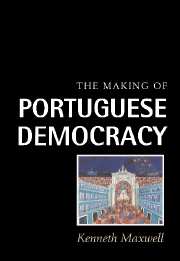Book contents
Conclusion
Published online by Cambridge University Press: 24 November 2009
Summary
The collapse of Portuguese rule in southern Africa in 1975 ended the last of Europe's overseas empires. Five and a half centuries after the conquest of Ceuta, for the first time the Portuguese standard was no longer hoisted above a fortress in Africa. The events of the mid 1970s in Portugal also played a significant and precocious part in the great ideological conflict of the twentieth century. The triumph for anticommunist democrats in the Portuguese domestic conflicts between 1974 and 1976, on the one hand, together with the initial victory of the communist-backed forces in Angola in the same period on the other, set in motion many of the forces which would help bring about the end of the Cold War in Europe, by reinvigorating democracy at the grassroots and by escalating the costs of proxy conflicts in the third world. By the 1990s, some political scientists, most notably Samuel Huntington, looking back at the 1970s, came to regard Portugal's democratization as the beginning of the “third wave” of democratization, which would see the fall of the communist regimes in eastern Europe and eventually in the Soviet Union itself, a period comparable to that of the 1820s and the 1940s in world history.
The chain of events set in motion by the April 1974 coup thus had widespread and long-lasting international ramifications.
- Type
- Chapter
- Information
- The Making of Portuguese Democracy , pp. 180 - 183Publisher: Cambridge University PressPrint publication year: 1995

